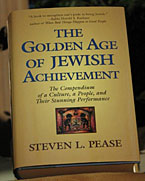Excerpt:
Science©
The Nobel Prize for Physics
Physics is perhaps the most recognized of the three primary scientific disciplines. The prominent names include the likes of: Albert Einstein, Marie and Pierre Curie, Niels Bohr, Enrico Fermi, Werner Heisenberg, Erwin Schrodinger (of "Schrodinger's Cat" fame), Max Planck, Felix Bloch, Arno Penzias, Murray Gell-Mann, and Richard Feynman, to name just a few. This is an elite group working in areas of great importance, too complex for most of us to fathom. Intellectually, their work is simply the leading edge. Ultimately, it touches our lives in the form of: X-rays, electrons, color photography, wireless radio, relativity, quantum physics, nuclear power and weapons, the nature of light, nuclear magnetic resonance, transistors, lasers, and other discoveries and inventions too numerous to describe.
So, who gets the awards? How have the Jews and others done in the competition?
Chance would say that of 174 prizes awarded from 1901 through 2004, Jews should have gotten none, or at best one. That is, with two-tenths of 1 percent of the world's population, one might reasonably expect Jews to get 2 of every 1,000 prizes (1 of every 500). With 174 prizes awarded, the odds are that at best one Jew might have earned a Nobel for physics, but only if that person beat the odds.
Actually, Jews have received forty-eight of the 174 awards. All forty-eight are identified in Exhibit 4a....
